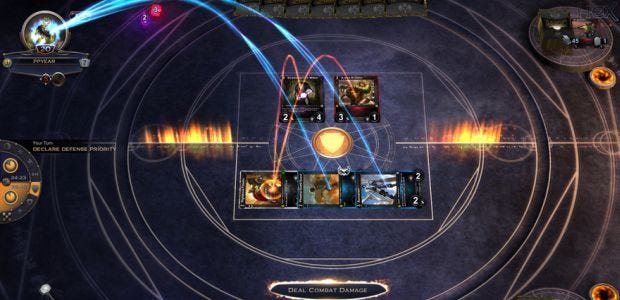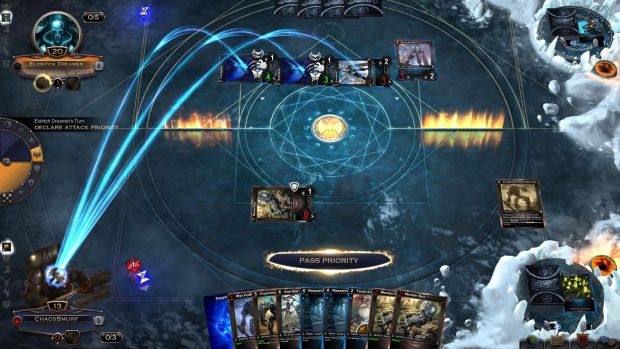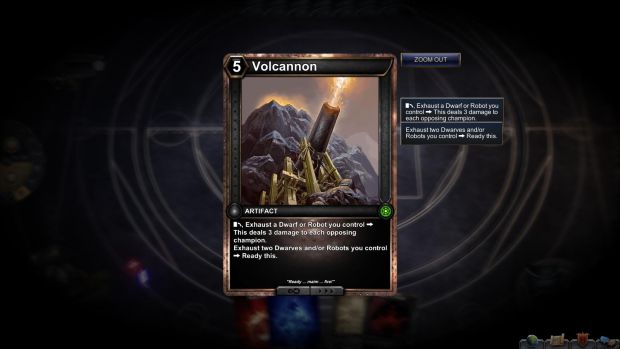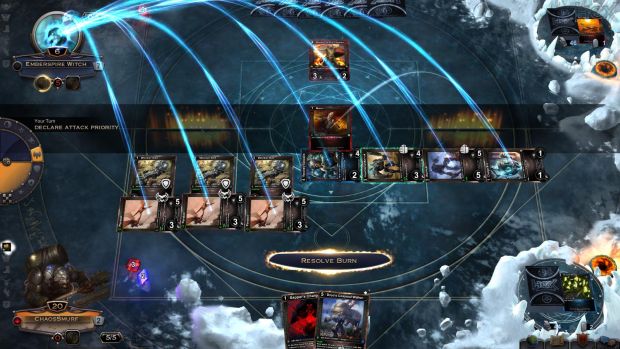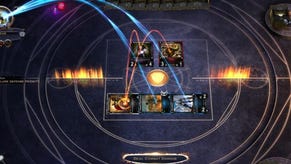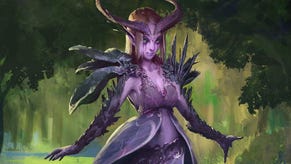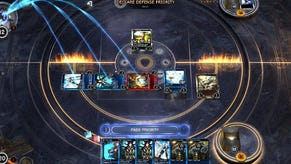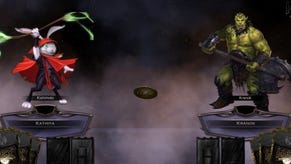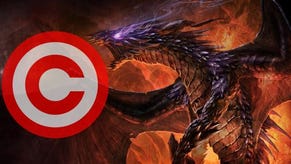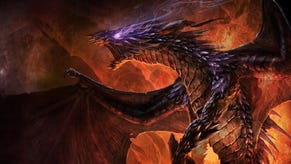Impressions: Hex - Shards of Fate
Pure magic or a raw deal?
Hex: Shards of Fate [official site] was kickstarted successfully in mid-2013, hot on the cardboard-heels of developer Cryptozoic's final set of the physical WoW TCG. Long before Hearthstone made it clear that digital cards were going to be a successful market, the gaming public pitched in two million dollars and change for the MMO/TCG hybrid. While its single player campaign and the MMO portion's dungeons, raids and guilds are yet to materialise, Hex is onto a third set release of cards in a free to play model. Here's some thoughts after a few hours of play.
I've been a Magic: The Gathering player for the last five years and so Hex is a strange game to write about. It's similar enough to the genre's most famous forebear that I feel like I'm already intimately familiar with its basic makeup, although it's from an unrelated design team who obviously follow different philosophies that result from Hex's purely digital nature.
In Hex, decks are sixty cards, with around a quarter dedicated to resources that are played for free and increase your total mana pool, allowing you to cast more powerful spells. In turn these resources govern what types of cards can be played, each providing a colour threshold along with its mana. In general, cards have a threshold that must be met to be cast - so for example a card may have a cost of five and a red threshold of two, meaning at the most basic level you must have played five resources, two of which were red, to cast it. You can only play one resource a turn and your mana refreshes at the start of each of your turns. The nature of Hex is that there will be cards that break all these basic rules - giving you more mana or putting resources into play from your deck - which is where the fun begins.
If you're familiar with Hearthstone, this may seem overly complicated in comparison and it only increases from there. Hex uses a priority system that allows players to react to every action an opponent takes with any of their own cards and effects, as long as the card doesn't have the "Basic" rider which means they can only be played on your turn. This means a finer degree of control is possible, with counter and kill spells that deal with opposing forces while protecting your own strategy.
The depth this adds is immeasurable, particularly when combined with the concept of cards and creatures - Hex calls them Troops - which have a permanent place on the board but aren't focused purely on attacking your opponent. Unfortunately, it's also the first of Hex's major problems.
The priority system is just clunky. The developers have done their best to streamline it but it's so slow compared to Hearthstone's superb ability to match whatever pace you wish to play at. While it does a better job than Magic Online or Duels of the Planeswalkers, it takes so many additional clicks to get through a turn, going between combat and casting phases, allowing opponents spells to resolve or activating legions of abilities. Against an auto-responding AI it's managable and Magic's real life equivalent gets away with it because body language, intuition and common sense speed things along. It's an excellent system from a card and game design point of view, just not one that was ever meant to be used in an online setting and after seeing alternatives, no matter how simple they make the game, I think I prefer them.
It can't be understated how much this additional complexity adds, however. Unlike its peers, Hex immediately has you doing powerful, near-broken things with starter decks. You're unlikely to be competitive at the highest level, but there's strategy and decision making to be done even early on, at least with the blue sapphire and red ruby dwarf deck I picked up. I'm quickly flooding the board with cheap artifact troops and dwarves which reduce the costs of my higher power cards or otherwise power them up. My favourite card is the Volcannon, a five mana artifact that allows me to deal damage directly to opponents with my troops, rather than having to attack them. I'll set up a defensive line of high health blockers and then quickly bomb my opponent out of the game once I've drawn it.
It's just one of a litany of cards that are miles above the power and complexity of what you start with in Hearthstone or Duels. It means there's much more play to the game before any money or time is invested on improving. This makes your first port of call on a new account, the Frost Ring Arena, much more enjoyable. It's a free and repeatable series of challenges against up to twenty AI opponents for various rewards and functions as a sort've preview of the eventual full campaign. You face off against decks and bosses that are equipped with gear that change their cards in unique ways. You also earn this gear as you play, letting you customise and power up your deck further specifically for singleplayer modes where nobody can cry balance. The Arena is also the only place in-game currency and cards can be earned freely rather than bought or competed for after an entry fee.
This is the second problem. Hex is an incredibly stingy free to play game in comparison to the norm. You can grind out low value gold from the Arena mode or you can get paying. Gold is only one of two in-game currencies, the other being much more valuable platinum. You can trade one for the other with players, and higher-level folks are likely to want gold for various reasons, but it's still achingly slow to get going. Compare to Hearthstone where nine decks are given to you to start off, the only currency is handed out pretty freely in the early game and your first draft is free. Plus in Hex the normal, no pay-in PvP mode that automatically finds you someone to play against gives you nothing. Hearthstone's 10 gold per win or League's meagre IP income rates are harsh, but at least it's something.
Hex's payment model is almost identical to Magic Online, although Hex's packs are a little cheaper in real money and MTGO has no way to get on the ladder other than paying. Tournaments can be bought into and reward you with packs, which can then be used to buy into more tournaments. At no point here do you want to actually open these packs just to get the cards; the trick is to do drafts (where players open boosters and pass the contents around to build decks), where you get to keep the cards you pick. There's also a chance that each pack you earn will come with a bonus Primal Pack, which cannot be used as entry fee and is designed so that savvy players still get that what's-in-the-box thrill.
It means the new player experience is a bit miserable. Even if the Frost Ring Arena was a champion of narrative (there isn't one) with incredible AI (worse than Duels' hardest settings, though not by much) and massive variation (I saw all the decks I could come up against after three runs) it wouldn't be fun to grind twenty times. Even if you're not averse to paying in, all this gets you is a draft or a very mediocre constructed deck, neither of which you're likely to take the cyber-bacon home with. See, Magic is already a ridiculously complex game that people who have played for twenty years are only approaching mastery of and Hex has added things on top of that. Card effects can now alter cards in libraries and hands permanently, since the system can keep track of it. Random effects are more common because there's no real-world dice-rolling or coin-flipping that needs to be done for it to happen. Players have champions that have a permanent effect on the board and repeatable powers using a whole seperate resource called "charges" which is, in turn, generated by cards and effects. Individual cards have 'sockets' that allow you fine tune them to your playstyle - the list goes on.
Hex is hard and more than a little random, which is fine. These are systems that are designed to swallow up hours, days, weeks, months and years of your life analysing, discussing, reading up on strategies, watching streams and so on. They'll also quickly empty your wallet however, and repeat that effect every time a new set is released or you get a hankering for a new style of play. The inter-connected economy and auction house do mean that your collection has some real world value and that individual cards can be purchased with ease, so long as you're willing to shell out for them - something Hearthstone sorely lacks.
As a new entry to the field, Hex has some other disadvantages its peers don't. The player base is not huge right now, meaning it can take some time for drafts or constructed events to fire and many of the pre-scheduled ones are cancelled. It's also running on a one-game-win default for its matches, which just isn't good enough for games with this much variance. Every match of Magic is 2-out-of-3 or better with a fifteen card sideboard you can customise your deck with between games and sometimes even that isn't enough for skill to win out over luck, even piloted by the best in the world.
Yet still, there is promise in Hex. For better and worse, it's deeper than anything else in the genre. If you've ever enjoyed a Duels game, it's the best version of that there's been, at least until Wizards' own free to play version appears later this month. I think a lot needs to change if it's to attract a larger audience, but I'll return to check out the singleplayer campaign when it goes live later this year.
